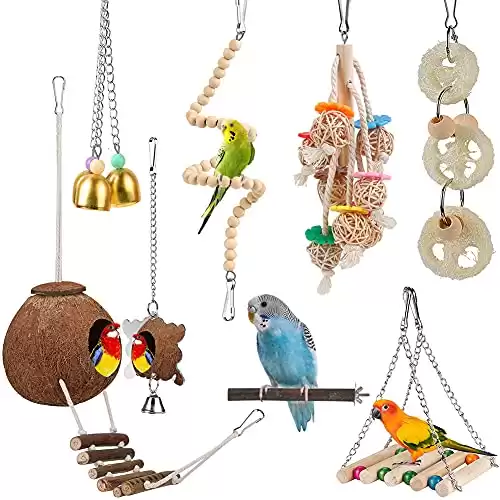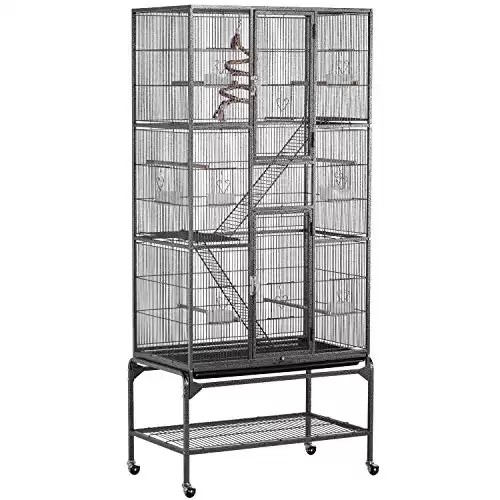Budgies do lay eggs without mating. In female budgies, the reproductive cycle is stimulated by hormones. Those hormones are triggered by external signs that the environment is suitable for raising young. Without a male, the female budgie will still lay unfertilized eggs.
Nesting behaviors in your budgie will tell you if eggs are on the way. For example, if your budgie lays unfertilized eggs, you can remove them as soon as your bird stops taking an interest in them.
Because frequent egg-laying can increase the chances of egg binding, you might want to take some steps to limit how often your budgie lays eggs.
Do Female Budgies Lay Eggs Without Mating?
Much like in humans, reproduction in female budgies is instigated by hormones.
However, unlike humans, who have a natural internal cycle, the reproductive cycle of budgies is based more on what is going on around them.
The season, temperature, and other external factors can cause a female budgie to begin forming an egg.
Because of that process, there really isn’t any need for a male to be involved. Female budgies can lay eggs regardless of whether or not they have mated.
What mating will change is whether or not the egg is fertilized. A fertilized egg has a small budgie growing inside it, while an unfertilized egg does not.
- Recommended read: Pregnant Budgie: Complete Care Guide
How Do I Know If My Budgie Is Going to Lay Eggs?
More often than not, your budgie’s behavior, more than the appearance of your bird, will let you know that eggs are on the way.
A budgie with an egg on the way might seem a little heavier or more round, but an egg isn’t always the cause of such an appearance.
You’re more likely to notice your budgie engaging in nest-building behaviors. For example, if you have a nest box in her cage, you might see her spending more time in it.
Budgies that are seen making nests somewhere in their cage have a strong chance of laying an egg soon.
How Often Do Budgies Lay Eggs?
In normal circumstances, budgies can lay up to 24 eggs per year, starting from the time they are at least five months old.
The overall number is divided into groups of eggs called “clutches.” Budgies may go through two or three clutches throughout the year.
They may lay anywhere from four to eight eggs in a clutch each time.
There can be some differences between the egg-laying habits of domestic budgies and wild budgies.
For wild budgies, the need to mate is based on the season, temperature, and abundance of food. Therefore, budgies in the wild will recognize the change from cold, short days to warm, long days.
That change represents the time of the year when it’s easier to raise young.
On the other hand, domestic budgies are kept indoors, where the temperature and day lengths can feel the same all year long.
In most cases, budgies in indoor environments are kept in conditions most similar to spring or summer.
In addition, most domestic budgies have plenty of food year-round. Combined, these factors make domestic budgies likely to lay more eggs than wild budgies.
Fertilized Vs. Unfertilized Eggs
Let’s say you have a female budgie laying eggs, and you aren’t sure if they are fertilized.
Maybe you’ve been trying to get fertilized eggs from a breeding pair, or you just aren’t sure whether your female budgie has spent time with a mating partner.
Unfortunately, some pet shops or breeders don’t keep males and females in separate cages, which means unintended mating can happen.
If you’ve been waiting for a mated pair to produce fertilized eggs, it might help to know that fertilized eggs can take about 10 days to show up after a successful mating.
To tell whether or not the eggs your female budgie has laid are fertilized, all you need is a flashlight.
Turn on the flashlight and point it directly upward, then get the egg close enough to the light to get an idea about what’s going on inside it.
Fertilized eggs will display veins running throughout the inside. Meanwhile, in unfertilized eggs, you’ll see only a yolk.
Handling Unfertilized Eggs
It’s no secret that rotten eggs smell like rotten eggs. So, it’s only natural that you’d be keen on removing unfertilized eggs from your budgie’s cage as soon as possible.
However, the speed at which you can get rid of the eggs depends on the budgie’s behavior. Some budgies can become attached to their eggs, which means getting rid of them quickly will stress the bird out.
Spend a little time observing how your budgie behaves around the eggs before deciding to take them away.
If the budgie doesn’t care much about the eggs, i.e., doesn’t nest or sit on them, you can probably get rid of the eggs without much of an issue.
However, if your budgie does behave as though the eggs are fertile, you might need to wait a few days for the bird to recognize that caring for the eggs isn’t worth the effort.
How Do I Stop My Budgie from Laying Eggs?
Some of you might be wondering why you might want to try to stop a budgie from laying eggs. After all, that’s what birds do!
Typically, egg-laying isn’t a problem among birds. This is because their bodies are designed to lay numerous eggs each year.
However, the more eggs a bird lays, the higher the chances that the egg she is trying to pass might break or become stuck.
If that happens, it can severely impact your bird’s health. Left untreated, the problem can even be fatal. Naturally, those who keep and adore budgies don’t want their pets to suffer.
It’s important to note that, generally, it’s impossible to stop a female budgie from laying eggs.
More drastic measures can be taken, such as salpingectomies or hormone injections.
However, it’s best to discourage the behavior before taking those steps.
Here are a few strategies you can use to ensure that your budgie lays as few eggs as possible:
- Keep females separated from males as much as you can. If you can keep them in separate rooms, even better
- Do not offer nesting materials or boxes to your female birds
- Frequently change the location of their cage and the items within it as spring draws near
- Limit the amount of daylight your birds experience so that the longer days won’t shift them into mating behavior
- Keep the room where your birds stay cool enough to avoid it feeling like spring
- Don’t pet budgies below their necks, as this can trigger mating behavior
According to the University of Sydney’s Faculty of Veterinary Science, low-fat foods can also help avoid an excess of egg-laying.
Read More:

My name is Niels Joensen, and I’m the creator of Wings and Beaks. I got my first two budgies at the age of 13, and right away, I fell in love with these beautiful tiny birds. Wings and Beaks is where I share my knowledge and passion for budgies with other bird owners.






